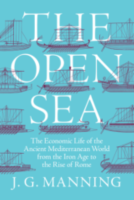
Princeton (2018) h/b 414pp £27.95 (ISBN 9780961151748)
As the 70 pages of bibliography show, Manning has read a great deal of scholarship on the economic life of the ancient Mediterranean in the first millennium BC. This book tells us a lot about what others have written, but what Manning himself wants to tell us is not easy to deduce. The two clearest lines of argument are: 1) that there was no single ‘ancient economy’; and 2) that both short-term and longer-term climate change had a significant effect (though the short term effects were on economic performance and not on the nature or structure of the economy itself). Manning is particularly keen on the effect of volcanic eruptions in reducing temperatures for two or three years afterwards and producing crop failure and consequent political destabilization; it must be somewhat frustrating for him that the year for which there is best climatic evidence for temperature reduction, 44 B.C., has a clear episode of political destabilization that is, however, least susceptible to being seen as even indirectly consequent on climatic change: would Caesar’s assassins have desisted had the weather been better?
What is frustrating for the reader is that very little of the book does what the titles would lead one to expect. A chapter entitled ‘Bronze, Iron and Silver’ is not in fact about metal resources and their exploitation—discussion of silver actually comes in a chapter entitled ‘The evolution of economic thought in the ancient world’ (a chapter which has next to nothing on explicit ancient theorisations of economic transactions, though is does manage the solecism of referring to Aristotle’s Nichomachean [sic] Ethics).
But then, the book as a whole does not live up to its title. Although the significance of changing numbers of shipwrecks comes round repeatedly, this is not in fact a book about the sea. The implicit promise that this is going head-to-head with Horden and Purcell’s The Corrupting Sea is never fulfilled: Manning engages with them on only three pages, and his chief complaint appears to be that they underestimated the effect of earthquakes and volcanism. There are some signs that Manning believes that ‘openness’ is a good thing (because it reduces transaction costs), but the extent to which the Mediterranean was ‘open’ during the period Manning discusses is never a major theme. Manning actually has very little interest in the Mediterranean west of the Aegean—Spain, Iberia, Sardinia, Sicily are all absent from the index, and Italy and Magna Graecia manage only 4 page references between them. Sadly, the work with which this is primarily arguing is still Finley’s Ancient Economy, for all that Manning regards Finley’s work as fundamentally mistaken in approach, as well as conclusions.
A book that aims to cover the ancient Near East as well as the Greek world, and to cover a millennium, is inevitably more up-to-date on some aspects than others, and this matters since Manning tends to quote scholarly conclusions rather than dig down into the data and arguments. There is a striking contrast with Alain Bresson’s The Making of the Ancient Greek Economy, published, also by Princeton University Press, in 2016, which is a model of clear presentation of data and lucid argument. For all of its narrower range, any reader interested in the ancient economy would be best advised to turn to Bresson.
Robin Osborne
